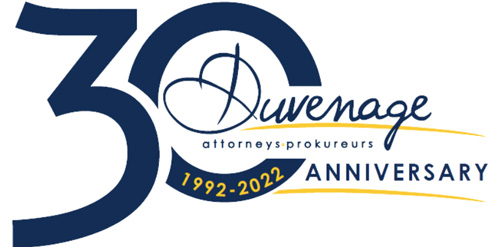On 21 January 2025, the Department of Employment and Labour released the Draft Code of Good Practice on Dismissal for public comment. The purpose of this code is to offer guidance to employers, employees, and other stakeholders on their legal obligations regarding the termination of an employment relationship, as outlined in the Labour Relations Act 66 of 1995.
The Draft Code covers all aspects of employment termination, including dismissal due to misconduct, incapacity, dismissals due to industrial action, or the employer’s
operational requirements.
The current Code of Good Practice: Dismissal, along with the Draft Code, serves as a guideline for both employers and employees. It is designed to be accessible
and intentionally broad, allowing for flexibility in its application.
Although both Codes are largely similar, the Draft Code aims to provide clearer guidelines for fair and lawful dismissals related to misconduct, incapacity, and operational requirements. Additionally, the Draft Code is more user-friendly and enhances navigation of the LRA.
The key changes introduced in the Draft Code are outlined below.
SMALL BUSINESSES
Similar to the existing code, the Draft Code acknowledges that the structure and substance of disciplinary rules will naturally differ, depending on the size and nature of a business. In particular, it recognizes that small businesses often lack
the capacity to conduct extensive investigations or implement complex pre-dismissal procedures.
Unlike larger organisations, they typically do not have dedicated human resource departments, staffed with professionals who possess specialised expertise in these matters. Consequently, when evaluating the fairness of a dismissal, it is essential
to take into account the practical constraints and operational realities that small businesses face.
Medium and larger businesses are still required to implement formal, written disciplinary rules and procedures. These serve to clearly define the standards of conduct expected from employees, while also ensuring that disciplinary measures
are applied consistently and fairly across the organisation. By having established guidelines in place, these businesses can promote a structured and transparent approach to workplace discipline.
MISCONDUCT
The Draft Code reinforces the importance of efficient dispute resolution and supports the legitimacy of informal disciplinary measures. Unlike the rigid requirements often associated with formal disciplinary hearings, the Draft Code allows employers to deviate from standard procedures, where justified, provided
they can defend such deviations if challenged.
A key emphasis is placed on ensuring meaningful dialogue with employees. Before any disciplinary decision is made, employees must be given a reasonable opportunity to reflect on and respond to allegations, ideally in a language they are
comfortable with. While this aligns with the current Code’s fairness principles, the Draft Code further underscores the value of procedural flexibility.
The principle of consistency in dismissal remains unchanged, but the Draft Code clarifies that an inconsistent application of discipline does not automatically render
a dismissal unfair if the misconduct is severe enough to make continued employment untenable.
One of the more significant relaxations in the Draft Code pertains to probationary employees. Employers will have greater ease in terminating employment during
probation due to poor performance or misconduct, as procedural requirements are slightly more flexible.
For employees beyond probation, the Draft Code retains the principle that performance standards must be reasonable and achievable. A key development is the specific recognition of managerial and highly skilled employees. The Draft Code
provides that, in circumstances where performances issues of these employees have severe consequences, then dismissal without prior warnings is warranted. However, employers must still afford such employees an opportunity to respond
before making a final decision.
INCAPACITY
In respect of incapacity, the Draft Code provides that employers must assess the extent of incapacity and explore alternatives before considering dismissal. Factors such as job nature, absence duration, condition severity, and feasibility of
temporary replacements should be considered. It is also noteworthy that the Draft Code has now expanded the definition of incapacity to include incompatibly, meaning an employee’s inability to work in harmony with an employer’s business culture or fellow employees, may justify dismissal.
The Draft Code expands on the considerations for dismissing employees involved in unprotected strikes. In addition to assessing compliance with the LRA, employers
must now evaluate factors such as:
- The conduct of both employer and employees during the strike;
- The legitimacy of the demands made by employees; and
- The duration and impact of the industrial action.
Another notable expansion is that, where appropriate, employers may fulfill procedural fairness requirements by calling for collective representations rather than individual hearings, which can expedite the process while maintaining fairness.
RETRENCHMENTS AND OPERATIONAL REQUIREMENTS
A notable addition to the Draft Code is the inclusion of retrenchment guidelines, previously addressed separately in the “Code of Good Practice on Dismissal Based on Operational Requirements”. While much of the content remains consistent, the Draft Code introduces a structured form for section 189(3) notices, offering employers a clearer framework for disclosing required information.
CONCLUSION
The Draft Code consolidates dismissal guidelines into a single, streamlined document, while introducing some measured relaxations and clarifications. Employers are not currently obligated to update their internal policies. In navigating dismissals, it remains critical for employers to uphold procedural and substantive fairness to minimize the risk of disputes. Members of the public are invited to submit written comments on the Draft Code within 60 days of its publication, this means that comments are to be submitted by 22 March 2025.
Written by: DUNSTAN FARRELL





